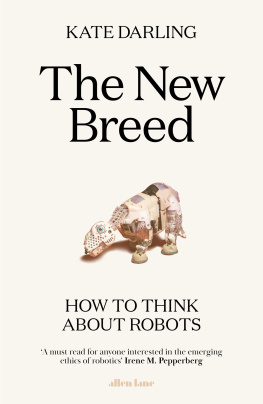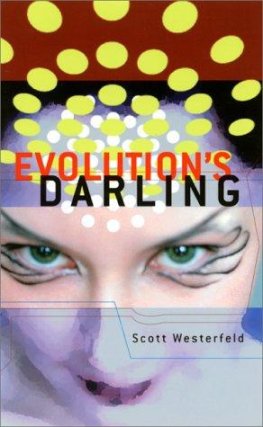Kate Darling - The New Breed
Here you can read online Kate Darling - The New Breed full text of the book (entire story) in english for free. Download pdf and epub, get meaning, cover and reviews about this ebook. year: 2020, publisher: Penguin Books Ltd, genre: Romance novel. Description of the work, (preface) as well as reviews are available. Best literature library LitArk.com created for fans of good reading and offers a wide selection of genres:
Romance novel
Science fiction
Adventure
Detective
Science
History
Home and family
Prose
Art
Politics
Computer
Non-fiction
Religion
Business
Children
Humor
Choose a favorite category and find really read worthwhile books. Enjoy immersion in the world of imagination, feel the emotions of the characters or learn something new for yourself, make an fascinating discovery.
- Book:The New Breed
- Author:
- Publisher:Penguin Books Ltd
- Genre:
- Year:2020
- Rating:3 / 5
- Favourites:Add to favourites
- Your mark:
- 60
- 1
- 2
- 3
- 4
- 5
The New Breed: summary, description and annotation
We offer to read an annotation, description, summary or preface (depends on what the author of the book "The New Breed" wrote himself). If you haven't found the necessary information about the book — write in the comments, we will try to find it.
The New Breed — read online for free the complete book (whole text) full work
Below is the text of the book, divided by pages. System saving the place of the last page read, allows you to conveniently read the book "The New Breed" online for free, without having to search again every time where you left off. Put a bookmark, and you can go to the page where you finished reading at any time.
Font size:
Interval:
Bookmark:

PENGUIN BOOKS
UK | USA | Canada | Ireland | Australia
New Zealand | India | South Africa
Penguin Books is part of the Penguin Random House group of companies whose addresses can be found at global.penguinrandomhouse.com.

First published in the United States of America by Henry Holt and Company 2021
First published in Great Britain by Allen Lane 2021
Copyright Kate Darling, 2021
The moral right of the author has been asserted
Cover photograph Gian Paul Lozza
Cover design: Olga Kominek
ISBN: 978-0-241-35301-1
This ebook is copyright material and must not be copied, reproduced, transferred, distributed, leased, licensed or publicly performed or used in any way except as specifically permitted in writing by the publishers, as allowed under the terms and conditions under which it was purchased or as strictly permitted by applicable copyright law. Any unauthorized distribution or use of this text may be a direct infringement of the authors and publishers rights and those responsible may be liable in law accordingly.
To my dad, who always encouraged an open mind.
Animals are good to think with.
Claude Lvi-Strauss
I was twelve weeks pregnant and nauseous, but excited. After two days of co-running a workshop in Mountain View, California, I had been handed an opportunity I couldnt resist, so I woke up at the crack of dawn and flew from San Jose to Denver to Boston to Zurich, and took multiple trains to Bavaria, Germany, determined to get to my destination: Ingolstadt.
Ingolstadt is a university town on the banks of the Danube River with beautiful red roofs and cobbled streets. Its famous for its nineteenth-century medical laboratory, where scientists and students performed experiments on dead pigs, inspiring Mary Shelley to situate a large part of her famous 1818 novel, Frankenstein, in this Bavarian city. But Frankenstein wasnt the reason I made the 5,800-mile trek. Ingolstadt also happens to be the home of Audi AG, the German luxury car manufacturer.
Audi had recently launched a research initiative to investigate societal questions around AI, autonomous vehicles, and the future of work, and I jumped at the invitation to attend a meeting in 2017, curious to know what was on their minds. By the time I made it to Audis base of operations, fueled by adrenaline and excitement, my body was moving into a new stage of pregnancy and my nausea was lifting (thankfully, as the catered buffet lunch in the room was a rich, pungent veal stroganoff on noodles). My visit included a tour of a factory floor where cars were made. It was a gray and cloudy day, and a bus picked us up outside the headquarters where the attendees had gathered and drove us through the drab and massive complex of buildings, dropping us off at a giant warehouse. I tossed my phone into a dirty rubber box in the hallway as instructed and followed our guide onto the factory floor.
In the factory, we marveled at massive cages encasing robotic arms that towered over our heads. The robots swung around and moved through their spaces in a fast, precise, and mesmerizing dance, sparks flying as they worked with the metal pieces that would eventually become cars. As we oohed and aahed over the spectacle, we gave barely any attention to the human workers who were stationed far away in another part of the room, doing something to the car bodies. The smooth operation of the robots seemed routine and almost boring to our guide, which was no surprise. Car companies have been working with caged robotic arms in their factories for decades. But the reason Audi had launched their new AI initiative was because the company knew that these factory robots, despite being an impressive display of high-quality German engineering, were not the robots of the future.
The world of robotics is changing. With increasing developments in sensing, visual processing, and mobility, robots are now able to move beyond their traditional caged existence in factories and warehouses and enter into new spacesspaces that are currently occupied by humans. Companies like Audi are investing heavily in AI and robotics, not just in their factories but also in their cars. Robots are now being put to work inspecting our sewers, mopping our floors, delivering our burritos, and keeping our elderly relatives company. From our households to our workplaces, a revolution is coming. What does this mean for the people I saw working across the room in the car factory? According to some of the headlines, they arent the only ones on the cusp of losing their jobs as robotic technology advances: we all are. Against the backdrop of broader economic and social anxiety, the conversation has turned from Will robots replace me? to How soon will robots replace me?
Many people are not thrilled by the anticipated robot takeover. Our concerns are particularly centered on the idea of creating something like us, with humanlike agency, that will take our steering wheels and harm us or our children. Headlines paint a dystopia of robot brothels and robot-run restaurants and hotels, a world where robots take all human jobs, and where our nannies and boyfriends are replaced by machines. In Mary Shelleys story, Victor Frankenstein studies medicine in Ingolstadt and creates an autonomous, intelligent being that eventually turns against him. Along with the golem from Jewish folklore, Frankensteins monster is considered an early story about robotics, despite being published more than a century before the word robot was coined. Science fiction writer Isaac Asimov would later describe a negative public attitude toward robots as the Frankenstein complex. Today, a car manufacturer is grappling with a modern version of the narrative that originated in the same city, Ingolstadt, over two hundred years ago.
Is this fear justified? It certainly looks like were trying to replace people with machines. In the fall of the same year I went to Ingolstadt, October 2017, Saudi Arabia granted a realistic-looking humanoid robot named Sophia Saudi Arabian citizenship. The announcement caused an uproar. A robot was being granted rights in a country that had barely announced (and not yet implemented) womens right to drive cars! I received a flurry of emails and phone calls, especially from reporters who wanted to explore whether robots deserved human rights. At this point, I was very pregnant and ignored most of them. I felt that citizenship for Sophia, a robot not nearly as advanced as people imagine, was basically a publicity stunt, but in usual fashion, when robots made the news, I received calls about the legal, social, and ethical issues involved. My own questions, however, centered on why this stunt generated so much attention in the first place.
My passion for robots and society goes back to when I was a law and economics grad student. While pursuing my studies, I met some students from robotics labs, started reading obscure robot ethics papers, and found myself arguing passionately with friends about robots, especially when Id had a drink or two. I bought a baby dinosaur robot pet that I adopted (more on this in ). Thus began my pursuit of questions such as What impact will increasing robotization have on society? It was the beginning of a completely different academic career than I had ever imagined for myself. For over a decade now, Ive worked side by side with roboticists and applied my legal and social sciences background to the technology. Ive researched literature, delved into human psychology, done experiments, and had conversations with people all over the globe.
Font size:
Interval:
Bookmark:
Similar books «The New Breed»
Look at similar books to The New Breed. We have selected literature similar in name and meaning in the hope of providing readers with more options to find new, interesting, not yet read works.
Discussion, reviews of the book The New Breed and just readers' own opinions. Leave your comments, write what you think about the work, its meaning or the main characters. Specify what exactly you liked and what you didn't like, and why you think so.













